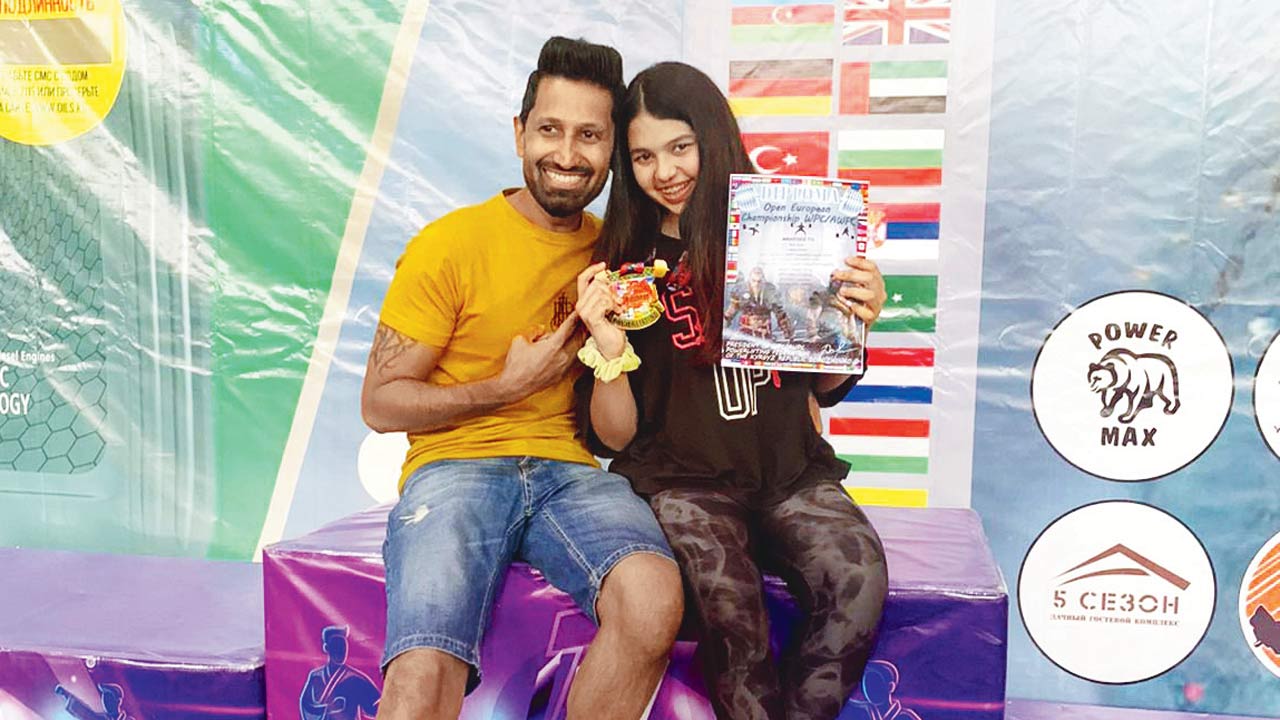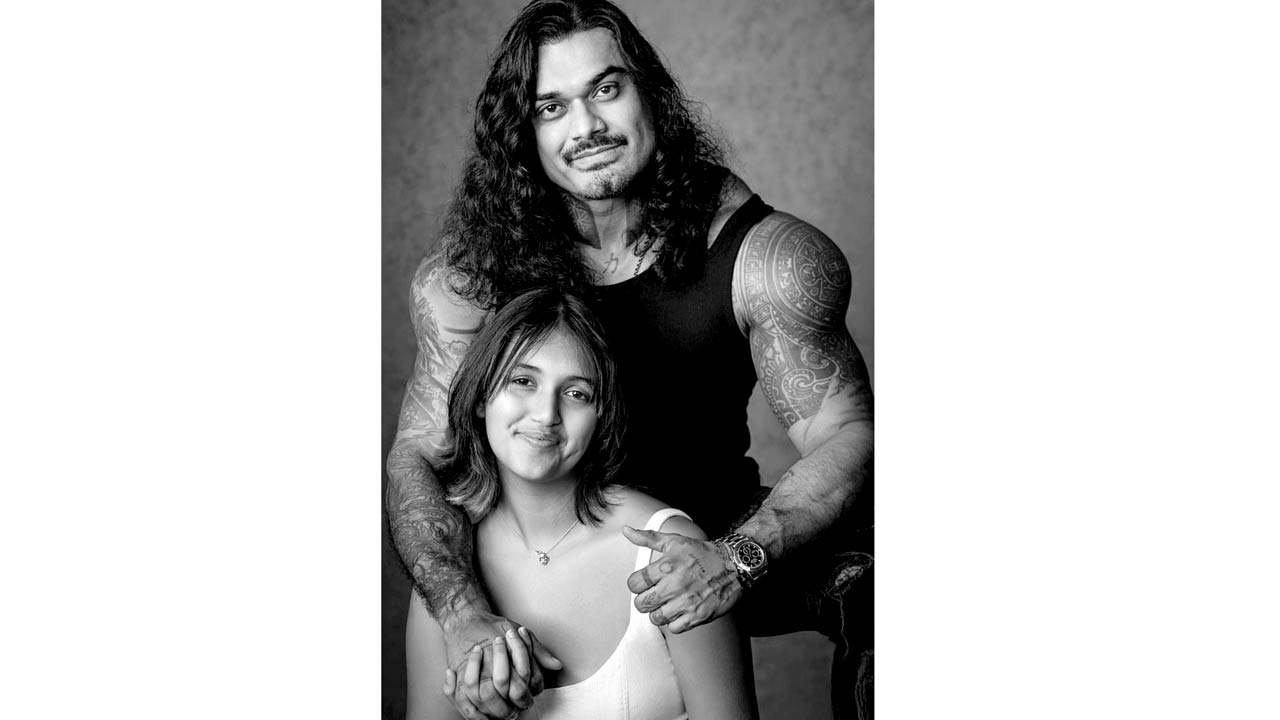It helps them grow stronger, taller, and frees them from stereotypes of what teen girls should look like. Noa Eappen and Kasha Sachdev are powerlifting their way to success, dads in tow

(From left) Kasha Sachdev, 15, and Noa Eappen, 13, are both gold medalists in powerlifting
If the teenage years are meant to raise some hell, 15-year-old Kasha Nia Sachdev and 13-year-old Noa Sara Eappen are truly different. At an age when peers are riding the latest viral Insta trend, or figuring which Taylor Swift aesthetic to style themselves after, the two are winning gold medals and that too, in the hypermasculine sport of powerlifting. The two have just returned from the World Powerlifting Championship in Kyrgyzstan, where Kasha won Gold and set world records in Teen 1, Female, Under 75 kg; and Noa won Gold and set world records in Teen-1, Female, Under 60 kg. Powerlifting is a strength sport that consists of three attempts at maximal weight on three lifts: squat, bench press, and deadlift.
We spoke to them and their fathers: Nicholai Sachdev, their coach, who is a powerlifter himself. He won Gold in bench press and Silver in deadlift at the recent championship. Rij Eappen is a luxury lifestyle digital content creator.
 Noa with dad Rij Eappen, who is a luxury lifestyle influencer
Noa with dad Rij Eappen, who is a luxury lifestyle influencer
Kasha, who stands at an impressive 6 feet, tells us how it all began for her at age eight after a knee surgery. It was to correct genu valgum or knock knees, a condition where the knees tilt inward while the ankles remain spaced apart. “First of all, everybody sees my scars, and asks ‘Are you okay?’,” she says, while her father quips, “Those are battle wounds!” “I was doing all these exercises to get back into shape,” Kasha continues, “and dad couldn’t see much improvement. He did some research and decided to enroll me in a gym. I felt better [after] working out, and since he is a powerlifter too—and a competitive one at that—we decided to give it a try. It fixed my knees, and I grew eight inches to be six-feet-tall! But the biggest transformation was in my confidence. I started seeing my body change, and truly began blossoming.”
Noa’s journey began at nine, when her parents wondered whether she was short for her age. “We consulted a few doctors,” says Eappen, “they confirmed it and suggested exercise. Her mother began taking Noa to the gym, where she met Kasha and Nick. Inspired by Kasha, she also took to the sport and Nick saw potential. He started training her, and that’s how she is where she is.”
 Kasha with dad Nicholai Sachdev, who also coaches the girls
Kasha with dad Nicholai Sachdev, who also coaches the girls
We wondered aloud whether there is a connection between powerlifting and growing those extra inches. “There are so many myths about weight training,” clarifies Nicholai, “That if you lift too much, it will stunt your growth. I read up clinical trials, researched pre-teen training and realised it actually helps secrete a growth hormone. In a closed, supervised environment, a child who runs, will run faster; a kid who jumps will jump higher; if someone has weak knees like Kasha, they will get better. Growth rate can be damaged even by sports such as horse-riding, but not in a training facility where everything is micromanaged. These two have been training for five years, and there have been very few injuries. They have challenged all misconceptions. We noticed a connection between growth and training—Kasha grew a foot, and Noa grew four inches. The whole body composition changes.”
The burden of being role models at such a young age may be heavy, but they are familiar with lifting the load—even excited by it. If Kasha’s main challenge was missing out on normal teen stuff such as attending birthday parties, Noa says building confidence in the face of teasing by peers was tough. “When I first started,” she says, “boys in my grade would tease me about powerlifting. I didn’t know how to cope, but as I kept training, I realised I didn’t have to prove anything to anyone. Another challenge was to remain in my weight category—I had to eat mindfully, count calories, and do cardio for at least three to four hours after weight training. But training made me realise I didn’t need to compare myself to others—here was something I was good at.”
For Kasha, it was more about FOMO (fear of missing out). “I was in the gym, and people were at parties,” she exclaims. “One has to sacrifice a lot as an athlete,” interjects Sachdev, “Kasha and Noa have come in during periods, while suffering headaches, with broken legs… they have even trained in crutches. There are no days off—no friend’s birthday, mother’s birthday. Whatever challenges life threw at them, they turned them around and fuelled their training. The last two years have been [extra] tough—meticulous eating, training… There is no time for friends. Rij has to make an appointment with Noa to meet her!” Rij smiles as he says, “Noa would love to eat pizza every day, but she knows she can’t. That’s the kind of discipline ingrained into their system.”
Sachdev nods affirmatively. “Powerlifting is not a movement,” he says, “it’s the discipline we instill in them, and the courage. It’s a huge win for the country, and for the girls. They keep smiling, and that’s worth it.” The duo does get time off, which Kasha spends playing with her dogs and singing; and Noa by binging on the TV show Friends.
As the girls recuperate before getting back to training, they are very clear about why they are doing this: To confront age-old notions that women can’t lift weights. Noa is following something she loves, and her father considers this sense of purpose most important. “To be so committed to something at such a young age is commendable,” he says. Kasha sums it up when she says, “It’s so important for girls my age to aspire to things that people think they can’t do. Society’s belief of what a woman can do and can’t do is rubbish. We should jump in, and support young women in their endeavors—like our dads have helped us.”
 Subscribe today by clicking the link and stay updated with the latest news!" Click here!
Subscribe today by clicking the link and stay updated with the latest news!" Click here!








